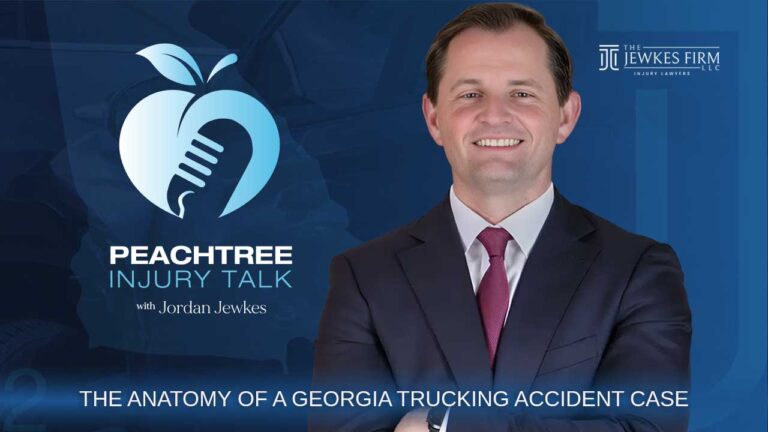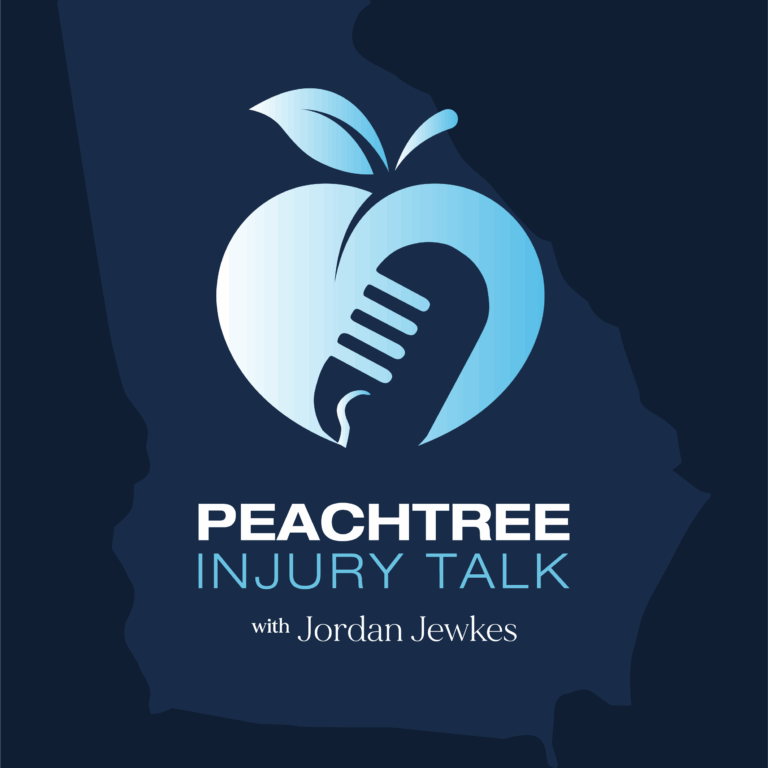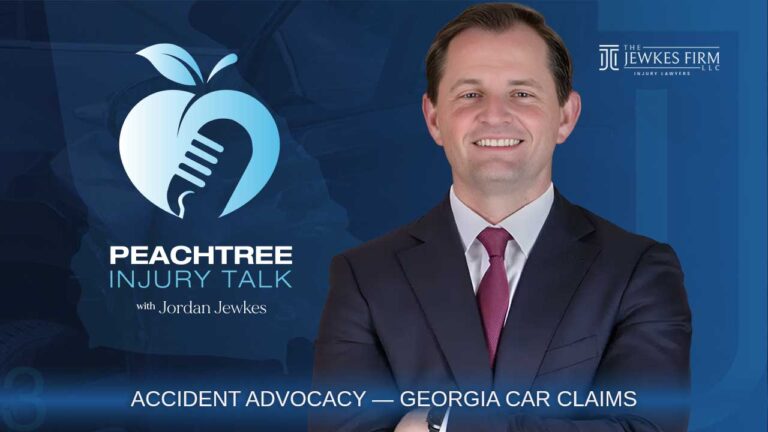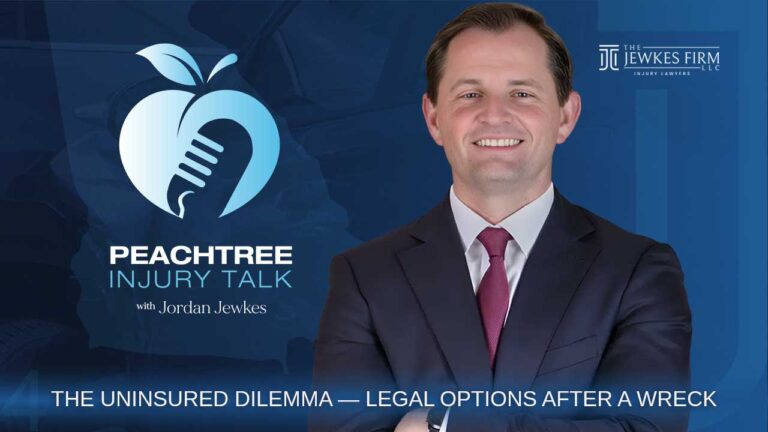
The Anatomy of a Georgia Trucking Accident
In this episode of Peachtree Injury Talk, attorney Jordan Jewkes discusses the critical aspects of trucking accident cases in Georgia. They explore the prevalence of
Home | Podcasts | Peachtree Injury Talk | Severe Injuries Resulting from Car and Truck Accidents in Georgia
Peachtree Injury Talk with Jordan Jewkes
In this episode of Peachtree Injury Talk, attorney Jordan Jewkes discusses the severe injuries often resulting from car and truck accidents in Georgia. He highlights the common types of injuries, particularly spinal and head injuries, and emphasizes the long-term impacts these injuries can have on victims’ lives. The conversation covers the challenges of diagnosing these injuries, the importance of seeking medical attention, and the emotional and psychological effects of severe injuries. Jewkes also addresses the legal challenges victims face when seeking compensation, focusing on the need for thorough documentation and support from medical professionals and loved ones.
| 00:00 | Narrator: Welcome to Peachtree Injury Talk with attorney Jordan Jewkes. |
| 00:05 | Kevin Rosenquist: Welcome to Peachtree Injury Talk with experienced attorney Jordan Jewkes. My name is Kevin Rosenquist, and today we’re going to talk about severe injuries that can result from car and truck accidents in Georgia. Jordan, great to see you. |
| 00:20 | Jordan Jewkes: Hey, thanks for having me back, Kevin. |
| 00:22 | Kevin Rosenquist: So can you describe some of the more common, severe injuries you encounter in car and trucking accidents on Georgia roadways? |
| 00:29 | Jordan Jewkes: Yeah, this is a great topic, because what one person sees as severe might not seem that way to someone else. We've talked a bit in past episodes about spinal injuries, and they really run the full spectrum. Spinal injuries are both common and often among the most severe—everything from a herniation to a ligament tear to a fractured vertebra or even nerve damage. These can cause chronic pain, immobility, and lifelong discomfort. Another type of injury that's become much better understood over the past five to ten years is head injuries. They're tough because they can be difficult to diagnose, but they’re among the most severe injuries we see. Literally mind-altering. Fortunately, the science and diagnostic tools are improving. So head and spine injuries are definitely the two most serious categories we deal with regularly. |
| 01:35 | Kevin Rosenquist: Yeah, we’ve talked before about how head injuries—especially in sports like football—are getting more attention and are being taken more seriously. Would you say head injuries often have the most long-term impact on a victim’s life? |
| 01:57 | Jordan Jewkes: Very often, yes. A traumatic brain injury, by definition, means damage to brain cells. That can range from a mild concussion, which is basically a bruise to the brain, to severe trauma—bleeding, skull fractures, permanent cognitive loss. The spectrum is broad. Sometimes people just have a lingering headache, and in other cases, they experience profound changes—they can’t walk, can’t talk, and they’re simply not the same person anymore. |
| 02:48 | Kevin Rosenquist: Even the so-called “mild” brain injuries can be deceptively serious. |
| 02:57 | Jordan Jewkes: You're exactly right. We have a case right now—can’t share the details—but our client hit her head in a crash. It wasn’t a serious-looking wreck, and she never thought she had a brain injury. But here we are, three or four years later, and she still suffers from significantly reduced brain function—memory problems, difficulty with numbers and scheduling, trouble doing her job. Before the wreck, none of that was an issue. |
| 03:40 | Kevin Rosenquist: That’s a great point—just because the car doesn’t look badly damaged doesn’t mean the person inside isn’t seriously injured. |
| 03:49 | Jordan Jewkes: Exactly. Most serious scientists, engineers, and doctors will tell you: brain injuries can absolutely happen in low-impact crashes. Your brain is suspended in fluid, and when your head whips forward or backward, your brain can slam against the inside of your skull—even if the car barely shows damage. There’s solid, peer-reviewed medical literature supporting that now. |
| 04:33 | Kevin Rosenquist: How do the severe injuries from trucking accidents compare to those from regular car accidents? |
| 04:38 | Jordan Jewkes: Trucking accidents typically involve bigger, heavier, faster vehicles. That means more force, and more force usually means more damage. Brain injuries are common in truck wrecks for that reason. That said, you can still suffer a severe injury in a collision between two private vehicles. But statistically, truck accidents tend to produce more serious injuries, so we’re especially alert to that in those cases. |
| 05:14 | Kevin Rosenquist: What about the impact of new safety technology like automatic braking systems and collision warnings? Are those helping reduce serious injuries? |
| 05:27 | Jordan Jewkes: I wish I could say yes, but not so much. I’m all for safer vehicles, and we absolutely need continued progress in that area—for private vehicles and commercial trucks alike. But we’re not there yet. In a perfect world, we’d have accident-proof vehicles and wouldn’t need lawyers or insurance anymore. We’re not close to that yet, unfortunately. |
| 06:07 | Kevin Rosenquist: What types of medical treatments are typically required for these kinds of severe injuries? |
| 06:13 | Jordan Jewkes: There are a variety of specialists depending on the injury. For spinal injuries, orthopedists and neurosurgeons are usually the go-to experts. They’re best equipped to evaluate, treat, and give long-term prognoses. For head injuries, neurologists are the specialists you want to see. They’re trained to diagnose and treat brain injuries and nerve-related conditions. Orthopedists focus on bones and joints, neurosurgeons on the spine and nervous system, and neurologists on brain and nerve function. |
| 07:12 | Kevin Rosenquist: I think most people try to avoid going to the doctor—“I’m fine, I’m fine.” Have you seen cases where people wait too long and it ends up being serious? |
| 07:26 | Jordan Jewkes: All the time. It’s human nature. We don’t want to appear weak or unhealthy, especially after something like a car wreck. We tell ourselves—and our friends, family, even church groups—that we’re fine. But avoiding treatment doesn’t help. And the insurance companies love it when someone waits two, three, even four weeks to see a doctor. They’ll use that delay against you, even though most of us avoid going just because we don’t want the expense or hassle. |
| 08:29 | Kevin Rosenquist: Yeah, ER visits are expensive. That’s a real concern—even for people with insurance. |
| 08:45 | Jordan Jewkes: Definitely. I remember from my own sports days—if something hurt, unless it was obviously broken, you just pushed through. And that mindset carries over. But it’s important to go get checked out, even if you think you’re okay. It could save you a lot of trouble later. |
| 09:26 | Kevin Rosenquist: Can you walk us through what the rehab process looks like for these life-altering injuries? |
| 09:32 | Jordan Jewkes: Sure. Let’s take a herniated disc as an example. The spine is made up of vertebrae and discs—those discs are like little cushions. Think of them like jelly donuts. If one herniates, that jelly leaks out. And just like squeezing toothpaste from a tube, it doesn’t go back in. It doesn’t heal itself. That means the damage is permanent, even if symptoms get better. You may not feel constant pain, but the injury is still there—and it makes you more vulnerable to re-injury in the future. Same goes for brain injuries. Even symptoms that seem to fade at first—like headaches or forgetfulness—can come back or linger indefinitely. |
| 12:02 | Kevin Rosenquist: There are emotional and psychological impacts too, right? |
| 12:17 | Jordan Jewkes: Without question. If you’re in constant pain, your sleep is affected, your thoughts are affected. You’re more focused on surviving the day than engaging with your family. You become irritable, you withdraw, and you’re just not the same spouse or parent anymore. And it’s very hard to quantify that. Insurance companies always want documentation—“Show us proof that you’re moodier or quicker to anger.” That kind of evidence is difficult to provide. But close friends, family, coworkers—those are often the best sources. They’ll say, “Jordan’s just not the same guy since the wreck.” Or “Kevin doesn’t laugh like he used to.” That kind of testimony is incredibly powerful. |
| 14:38 | Kevin Rosenquist: What legal challenges do victims face when trying to get compensation for more serious injuries? |
| 14:48 | Jordan Jewkes: It often comes down to documentation. We need to show the insurance company evidence of the injury and its effects. Medical records are part of it, but we also gather statements from spouses, coworkers, friends, pastors—anyone who’s seen the change. Documentation is key, and that’s one of the biggest parts of what we do. |
| 15:55 | Kevin Rosenquist: Aside from documentation, how else does your firm help clients after a serious accident? |
| 16:04 | Jordan Jewkes: Our first priority is helping people get the medical care they need. Money is important, but it won’t restore your health. If you have a permanent brain or spine injury, no settlement is going to truly make that right. So we focus on helping people heal. We also assist with work-related challenges. If someone can’t do their job anymore, that creates stress, anxiety, and financial pressure. We help guide them through that process and explore options for income replacement, benefits, or disability if needed. |
| 17:10 | Kevin Rosenquist: Thanks for joining us today on Peachtree Injury Talk with experienced attorney Jordan Jewkes. If you'd like to get in touch with Jordan, his website is jewkesfirm.com (http://jewkesfirm.com). Please like and subscribe to the channel to stay up to date on all things Georgia injury law. Jordan, thanks so much. Great talking to you. |
| 17:26 | Jordan Jewkes: Thanks, Kevin. I enjoyed it. |
| 17:28 | Narrator: Thanks for watching. Be sure to hit that like and subscribe button and leave us a review in the comments. |

Peachtree Injury Talk is a podcast by Kevin Rosenquist featuring legal insights and practical advice from Georgia-based attorney Jordan Jewkes. The show focuses on personal injury law, offering listeners expert guidance on navigating insurance claims, understanding legal processes, and protecting their rights after an accident. Each episode dives into real-life case examples, common challenges injured individuals face, and actionable tips for dealing with insurance companies and legal hurdles.
Episode Summary
In this episode, Jordan Jewkes and Kevin Rosenquist dive deep into the risks and mistakes associated with social media use after an auto accident. Jordan explains how social media can impact personal injury claims, both positively and negatively. He highlights the dangers of misleading attorney advertisements, the long-term effects of social media posts, and how insurance companies scrutinize your online presence. Whether it’s sharing personal experiences or the risk of posting something that could be used against you, the episode stresses the importance of being mindful of what you share online during the claims process.
Time Stamps
00:00 – Introduction to Peachtree Injury Talk with Jordan Jewkes
00:42 – The rise of social media’s influence on personal injury claims
01:55 – Dangers of using lead generation companies from social media ads
03:36 – How social media posts can hurt or help your personal injury case
04:19 – The consequences of posting on social media during an injury claim
05:33 – When social media posts can harm your case, with examples
06:34 – Common social media mistakes that hurt personal injury claims
08:05 – How social media can sometimes benefit your case, with practical tips
10:19 – The importance of social media scrutiny and its effect on the case
12:46 – Real-life example of social media affecting a personal injury case
14:04 – The balance of privacy and social media during injury claims
15:17 – Final advice for clients: Be cautious with your online presence
16:18 – Conclusion and thanks for tuning in
About the Show
Peachtree Injury Talk, hosted by Kevin Rosenquist, features attorney Jordan Jewkes as he discusses the nuances of personal injury law, providing valuable advice for those navigating the aftermath of accidents. This show aims to educate injured victims on how to protect their rights and avoid common pitfalls in the legal system.

The Hidden Toll — Severe Injuries Resulting from Car and Truck Accidents in Georgia breaks down the severe injuries resulting from car and truck accidents in Georgia. They emphasized the complexity, severity, and long-term impact of such injuries on victims’ lives.
Jewkes identified spinal and head injuries as the most serious and frequent injuries he encounters. Spinal injuries vary widely, including herniated discs, ligament tears, fractured vertebrae, and nerve damage, often causing chronic pain, immobility, and lifelong discomfort. Head injuries, particularly traumatic brain injuries (TBI), range from mild concussions to catastrophic brain trauma, such as bleeding and permanent cognitive loss. Even mild brain injuries can cause lasting problems with memory, concentration, and job performance.
A critical point made was that the extent of visible vehicle damage often does not correlate with injury severity. Even low-impact crashes, with minimal car damage, can produce serious brain injuries due to the brain’s movement inside the skull during rapid acceleration or deceleration. This is supported by peer-reviewed medical research.
Jewkes explained that trucking accidents tend to cause more severe injuries because trucks are larger, heavier, and faster, delivering greater force in collisions. Brain injuries are notably more common in truck wrecks, though serious injuries can certainly occur in small vehicle collisions as well.
While newer vehicle safety technologies like automatic braking and collision warnings are promising, Jewkes expressed skepticism that these systems have yet significantly decreased serious injuries, especially in the commercial trucking sector. Continued advancements are needed to approach injury prevention more effectively.
The treatment of these severe injuries requires specialist care: orthopedists and neurosurgeons focus on spinal injuries, while neurologists manage brain and nerve injuries. Jewkes stressed the importance of victims seeking timely medical evaluation, noting that many delay treatment due to denial, cost concerns, or a “tough it out” attitude, which can hinder recovery and complicate legal claims.
Rehabilitation from injuries like herniated discs and brain trauma can be prolonged and incomplete. Herniated discs do not regenerate, remaining a permanent injury that increases vulnerability to re-injury. Brain injury symptoms may vary over time, with some cognitive and emotional effects persisting indefinitely. There are significant psychological and interpersonal impacts such as mood changes, social withdrawal, and family strife, often difficult to prove but crucial for legal cases.
Securing fair compensation heavily depends on thorough documentation — medical records plus collateral testimony from family, friends, coworkers, or clergy who observe the victim’s post-injury changes. This comprehensive evidence helps overcome insurance companies’ skepticism and denial tactics.
Jewkes described his firm’s focus not only on obtaining settlements but also on helping clients access medical care and navigate work-related difficulties, such as job loss or disability benefits. They recognize that monetary compensation cannot fully restore health, so holistic support is crucial.
This conversation illuminated the physical, emotional, and financial devastation caused by severe injuries from Georgia car and truck accidents. Early medical intervention, multidisciplinary treatment, robust documentation, and dedicated legal advocacy are all essential to effectively address the profound life changes these injuries cause. For more information, reach out to The Jewkes Law Firm at (770) 771-5130.
Welcome to Peachtree Injury Talk—your essential podcast for navigating the often bewildering landscape of personal injury law. In each episode, join Attorney Jordan Jewkes as he unpacks the complexities surrounding your rights in the unfortunate event of an accident.
Through engaging dialogue and expert insights, Jordan demystifies legal jargon. He presents practical, applicable, and relatable scenarios that will resonate with listeners. Whether you’re dealing with the aftermath of a car accident, a slip and fall incident, or any other personal injury matter, Peachtree Injury Talk aims to empower you with the knowledge you need.
Each episode is designed to be accessible and informative. Thus, making it easier for you to understand the steps you should take to protect yourself and your interests. Jordan Jewkes shares real-life cases, common pitfalls to avoid, and tips on securing the compensation you deserve.
Additionally, the podcast fosters a community atmosphere where listeners can feel comfortable asking questions and seeking guidance. This supportive environment is a testament to The Jewkes Firm’s commitment to helping individuals understand their legal options.
So, whether you’re a seasoned listener or tuning in for the first time, prepare to arm yourself with valuable insights that can significantly influence your recovery journey. Tune in to Peachtree Injury Talk. Equip yourself with the vital information needed to navigate your rights confidently and get the support you deserve!
This show is designed to deliver general information regarding the law. Our guests will not provide tailored legal advice. If you have a personal issue and need legal support, get in touch with us for a free consultation with a Jewkes Firm attorney.
Subscribe to our newsletter for essential updates and expert legal advice.

In this episode of Peachtree Injury Talk, attorney Jordan Jewkes discusses the critical aspects of trucking accident cases in Georgia. They explore the prevalence of

In this episode of Peachtree Injury Talk, attorney Jordan Jewkes discusses the current state of personal injury law in Georgia, focusing on the alarming trends

In this episode of Peachtree Injury Talk, attorney Jordan Jewkes discusses the critical topic of uninsured and underinsured motorists in Georgia. Jordan explains what uninsured